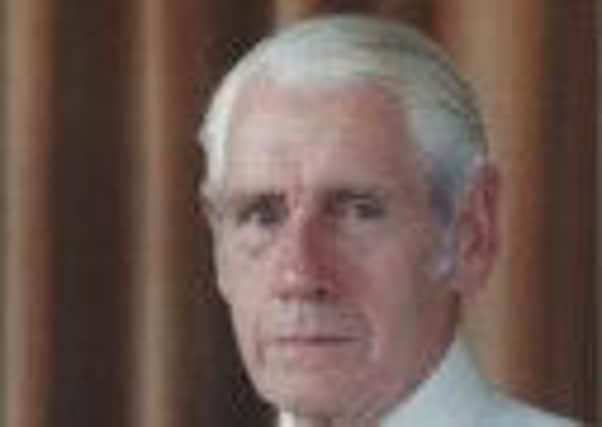Obituary: Wallace Barr, consultant obstetrician


Wallace Barr, consultant obstetrician and gynaecologist. Born: 6 April, 1919, in Paisley.
Died: 27 December, 2014, aged 95.
Wallace Barr, who has died at the age of 95, was a well-known consultant obstetrician in the Glasgow area. Born and bred in Paisley, he was educated at the John Neilson Institute and left aged 15, with the Dux medal. He wished to study medicine but was too young to enter the medical course, so he overcame this problem by entering the combined Science Medicine Course, qualifying BSc in 1938 and MB ChB, with commendation, in 1941.
Advertisement
Hide AdAdvertisement
Hide AdAfter resident jobs in the Royal Infirmary and Stobhill Hospital, he was drafted into the army. He found himself as a medical officer to the 11th Battalion Green Howards in Lincolnshire.
He found this exceedingly boring so, along with a friend and colleague, he requested an overseas posting. This turned out to be to France – on D-Day.
He had trained to be part of a Beach Group and landed in Normandy at 08:30am immediately behind the engineers who had cleared the mines.
After the successful landing and treatment of immediate casualties, including a case of acute appendicitis, he was then directed to 21st Army Group headquarters where he was employed as a GP for the HQ personnel.
He conducted a daily surgery and treated their day-to-day illnesses. In particular he had to treat Field Marshall Montgomery with the new “wonder drug”, Penicillin, and maintained that the success of his treatment was vital to the Allies’ progress across Europe.
After VE-Day he was promoted to Major and posted to Holland, dealing with malnutrition and its consequences amongst the citizens. Six months later he was promoted to Lieutenant Colonel in command of the British Military Hospital in Jhansi, India, fighting off malaria and snake bites. He remained there until returning to the UK to be demobbed in 1946.
During the war, Wallace married Margaret Balnave, whom he had known since schooldays. After the war they settled back in Paisley and raised a family of four.
Professionally, he decided on a career in obstetrics and gynaecology. He acquired the degrees of MRCOG, FRCS and then FRCOG. With the arrival of the NHS in 1948 he was appointed consultant gynaecologist in the Western Infirmary and consultant obstetrician in the Professorial Unit at Rottenrow. He was also appointed honorary clinical lecturer by the university.
Advertisement
Hide AdAdvertisement
Hide AdHe enjoyed teaching undergraduates and younger colleagues and was involved in many examinations over the years.
In 1964 he moved to the new Queen Mother’s Hospital. The professor was Ian Donald and they formed a close working professional relationship and personal friendship that lasted until Ian’s death in 1987. In addition he formed strong friendships with his consultant colleagues that lasted long after his and their retirements.
He had many research interests and published many papers. He always loved the challenge of being in the operating theatre and dealing with clinical problems.
He was an active member of the GVS and other obstetrical and gynaecological societies. In 1971 he wrote a textbook, Clinical Gynaecology. In later life, along with his good friend James Willocks, he co-authored Ian Donald – A Memoir. Always busy in NHS service, he also established a thriving private practice.
Wallace and Margaret loved Lochranza on the Isle of Arran and in the early 1960s they purchased a very small cottage in the village. He attacked DIY with the same energy and enthusiasm as he did surgery and soon built on multiple extensions with his own hands.
He enjoyed the annual family holidays in Lochranza and sailing around Arran waters in his motor sailing boat. He made many friends on the island.
He was an active sportsman throughout his whole life and played hockey, soccer and tennis when younger and then golf later.
He carried on playing golf into his 90s. He had joined Erskine Golf Club and was captain in 1978. He also loved competing at golf with his Glasgow medical colleagues against their Edinburgh counterparts.
Advertisement
Hide AdAdvertisement
Hide AdHe was a member of Rotary for many years and his interests included classical music, opera and theatre. Living in Paisley throughout his life, he had many long-standing friendships and was active in many social events in the town. He developed a reputation as an after-dinner speaker and used the family as a trial audience, pinching any new jokes they told him.
Margaret died in 1997 and he is survived by his four children, Margot, Johnny, Gavin and Alan, three of whom went into medicine while one became a lawyer.
He made their partners very welcome into the family. He has eight grandchildren and one great grandchild. Very independent at home to the end, he died in hospital after a short illness.
CONTRIBUTED